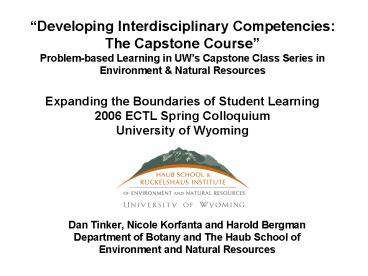Developing Interdisciplinary Competencies: The Capstone Course Problembased Learning in UWs Capstone - PowerPoint PPT Presentation
1 / 16
Title:
Developing Interdisciplinary Competencies: The Capstone Course Problembased Learning in UWs Capstone
Description:
Dan Tinker, Nicole Korfanta and Harold Bergman. Department of Botany and The Haub School of ... Goal of the University of Wyoming's Academic Programs in ENR ' ... – PowerPoint PPT presentation
Number of Views:64
Avg rating:3.0/5.0
Title: Developing Interdisciplinary Competencies: The Capstone Course Problembased Learning in UWs Capstone
1
Developing Interdisciplinary CompetenciesThe
Capstone CourseProblem-based Learning in UWs
Capstone Class Series in Environment Natural
ResourcesExpanding the Boundaries of Student
Learning2006 ECTL Spring ColloquiumUniversity
of Wyoming
- Dan Tinker, Nicole Korfanta and Harold Bergman
- Department of Botany and The Haub School of
- Environment and Natural Resources
2
Goal of the University of Wyomings Academic
Programs in ENR
- to add a breadth of
interdisciplinary training in ENR issues,
approaches and practices to the depth of training
that students receive in traditional academic
disciplines.
3
Curriculum in the UW Haub School of Environment
and Natural Resources
- Undergrad double major (does not stand alone)
- 6 core ENR courses (16 credits)
- 6 distribution courses (18 credits)
- Masters double major (does not stand alone)
- 2 core ENR courses (6 credits)
- 3 distribution courses (9 credits)
- Undergrad, Masters PhD minors
4
(No Transcript)
5
Affiliated (Second) Majors of ENR Students
Modified September 2005
6
ENR Capstone Class Series
- ENR 3000/5000 - ENR Approaches (Fall)
- Policies, laws, regulations, assessments
- Advanced ENR management approaches
- ENR issues survey
- Team-written proposals on class problem
- ENR 4900/5900 - ENR Practice (Spring)
- Major class project (based on proposals from fall
class) executed by 6 to 8 interdisciplinary teams
and integrated into a single class report
7
ENR Class Project Elements
- Problem-based learning approach
- Complex (seemingly intractable) real-world
problem - Physical, biological and human dimensions
- Extensive field trips
- Interdisciplinary
- Team structured and evaluated
- Graduate - undergraduate mixed teams or 5 to 7
- Graduate student team leaders
- Faculty mentors for each team
- Mid-semester and final team presentations
- Final, integrated environmental assessment report
- Peer evaluation
8
What is Problem-based Learning?
- "How can I get my students to think?"
- Problem-based learning (PBL) is an instructional
method that challenges students to "learn to
learn," working cooperatively in groups to seek
solutions to real world problems. These problems
are used to engage students' curiosity and
initiate learning the subject matter. PBL
prepares students to think critically and
analytically, and to find and use appropriate
learning resources. - - http//www.udel.edu/pbl/
9
Problem-based Learning
- What is PBL?
- A form of learning that involves presentation of
a problem to generate a need to know students
then learn the approach and the content as they
attempt to solve the problem. - Characteristics of PBL
- Problems are ill-defined (like real-world
problems) so that an iterative process is used in
defining, solving and redefining the problem. - Students are only given guidelines for how to
solve the problem, rather than a series of
precise steps. - The instructors are present only as facilitators,
mentors or guides.
10
Upper Green River Field Trip
11
Typical Team Structure
- Air quality
- Water quality
- Fisheries habitat and populations
- Wildlife habitat and populations
- Cultural and aesthetic resources
- Socioeconomic resources
- Plus integration teams with one representative
from each topical team - Scenario development team
- Geospatial analysis team
- Synthesis team
12
Yellowstone National Park Wildland Fire
Management Plan Environmental Impact Statement
ENR 4900/5900 Spring 2003 Class Project
13
Class Environmental Assessment Reports ENR
4900/5900
- Southwest Wyoming Oil and Gas Development (1999)
- Coal Bed Methane Development in the Powder River
Basin (2000, 2001) - Population Growth and Redistribution Effects on
Land Use in Wyoming (2002) - Yellowstone National Park Wildland Fire
Management Plan (2003) - Wyoming Energy Development Scenarios 2000 to 2025
(2004) - Oil and Gas Development in the Upper Green River
Basin (2005) - Climate Change Effects on the Colorado River
Watershed through 2050 (2006)
14
Helpful PBL Web Sites
- University of Delaware
- http//www.udel.edu/pbl/
- University of Delaware PBL Clearinghouse
- https//chico.nss.udel.edu/Pbl/
- University of Calgary Social Work
- http//www.fsw.ucalgary.ca/ then search site for
Problem-based Learning
15
www.uwyo.edu/enr(307)766-5080
16
Red Canyon Ranch Field Trip

